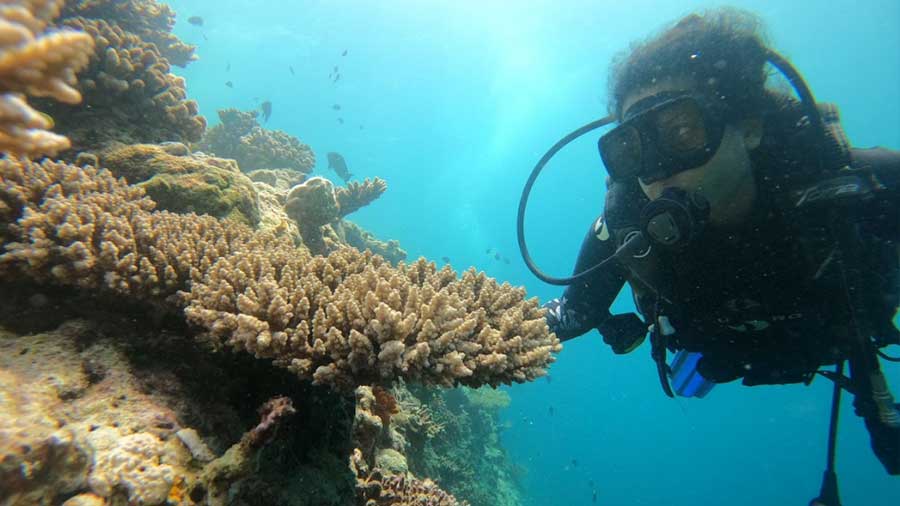Bleached corals, withered planktons and starving sharks are not the first images that come to mind when one thinks of climate change. And yet, the depletion and degradation of marine life in the oceans is as stark a reality today as the melting of polar ice caps or the foul air of big cities.
But how does one spread the word about marine ecosystems and how to preserve them? Coral Warriors, India’s first organisation to provide a diving grant, has come up with an answer. Dive, discover, discuss and disseminate. By providing financial aid to diving aspirants, Coral Warriors aims to generate an informed conversation about climate change and its impact on marine biodiversity.
Heading Coral Warriors is Vidhi Bubna, who is not just an expert diver and administrator but also an ambassador and author driven to leave the world a better place than she found it.
My Kolkata caught up with the enterprising Bubna to take a deep dive into Coral Warriors, marine life, the function of wokeness and much more.
Edited excerpts from a Zoom call connecting a breezy Kolkata evening and a torrential one in the Maldives (where Bubna had gone diving).
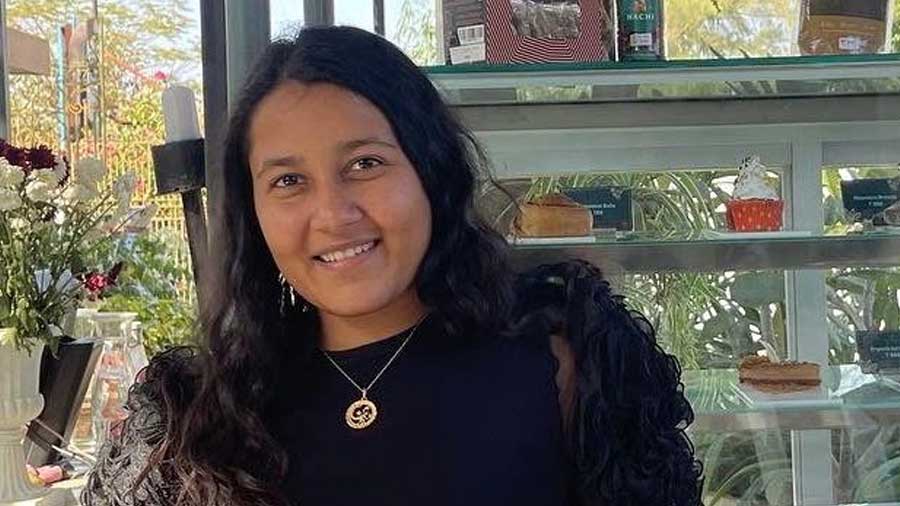
Bubna, who studied economics at Ashoka University, founded Coral Warriors in 2021 Courtesy: Vidhi Bubna
My Kolkata: Tell us a bit about your background and what encouraged you to set up Coral Warriors.
Vidhi Bubna: I graduated in economics from Ashoka University in 2019, but I realised the subject wasn’t something I was interested in, going forward. So I started writing articles, which led me to eventually write my first book (more on that later). Meanwhile, sometime in the middle of last year, I had an idea to go diving in the Andaman Islands and enjoyed it a lot. Ever since then, I’ve only been diving!
On my first dive, I noticed how most of the coral reefs in Andaman were dead. When the corals are alive, they’re very colourful, but it was completely white inside the ocean. When you see channels like National Geographic taking you underwater, you never end up seeing the bleached corals, you only see the vibrant ones. I had gone diving with a lot of expectations, only to find a graveyard down there. It was quite emotional for me, and in some ways, I felt responsible. Even though I live in Mumbai, I thought there was a chain of responsibility through which people like myself were inadvertently contributing to the coral damage in Andaman. The same holds true for other places like Lakshadweep and Goa. All this led me to Coral Warriors.
The main motivation behind starting the organisation was that in order to understand climate change underwater, you need to see it.
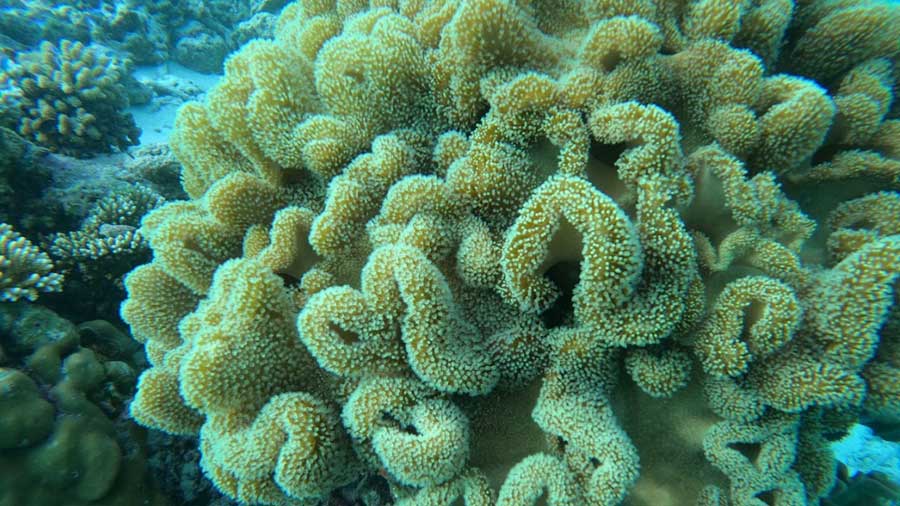
Bleaching of corals is one of the biggest consequences of climate change on marine life Courtesy: Vidhi Bubna
Would it be correct to say that the focus of Coral Warriors is two-fold – one to provide grants to divers and the other to help generate awareness on marine conservation?
Yes, that’s correct. Additionally, we’re also organising online workshops to educate people about marine biodiversity, because there are so many different marine organisms like whale sharks, stingrays, manta rays, among others, which people don’t really know about. And when it comes to students or the youth in India, they aren’t deeply aware of marine life and everything it entails. So these online workshops are a way to address that. So far we’ve been able to inform and educate around 5,000 people about marine organisms.
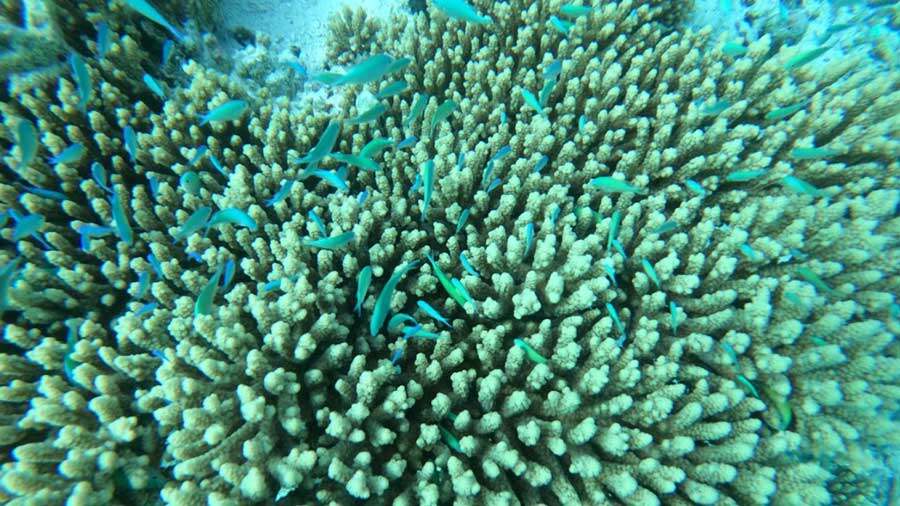
Coral Warriors organises regular online workshops to spread knowledge about marine organisms Courtesy: Vidhi Bubna
The grants from Coral Warriors are open to divers from India as well as Brazil. Why?
Brazil, just like India, doesn’t have a lot of opportunities for divers, with financial constraints being a major reason. Moreover, when I was diving, I came across this species called the Brazilian guitarfish (also visible in the Maldives apart from Brazil), which is an endangered species. That led me to research more about Brazil and I found out that despite there being a lot of great scuba diving spots in Brazil, it’s not seen as a diving destination. At Coral Warriors, we want to change that and create more openings for Brazilians so that they can explore creatures like the guitarfish.
You are a master scuba diver yourself. What are the experiences and challenges of scuba diving that Zindagi Na Milegi Dobara never told us about?
As a female diver from India, the major challenge is convincing your parents that it’s safe to go diving. But the entire diving programme, if you put your mind to it, isn’t that challenging. With a good set of instructors, you can learn how to dive easily.
When you first start diving, it can be quite nerve-wracking. Because you don’t know what you’re getting into, what kind of fish are going to be there. Swimming with sharks, for instance, is something you can never imagine in your life. Unless you’ve actually done it. You’re not even told by the instructors to expect a shark. I saw it and went, ‘Wow!’. And suddenly, I found there wasn’t one, but about 10 sharks swimming by. But it’s a beautiful experience because it makes you realise that all these species, which are considered to be dangerous, aren’t really dangerous.
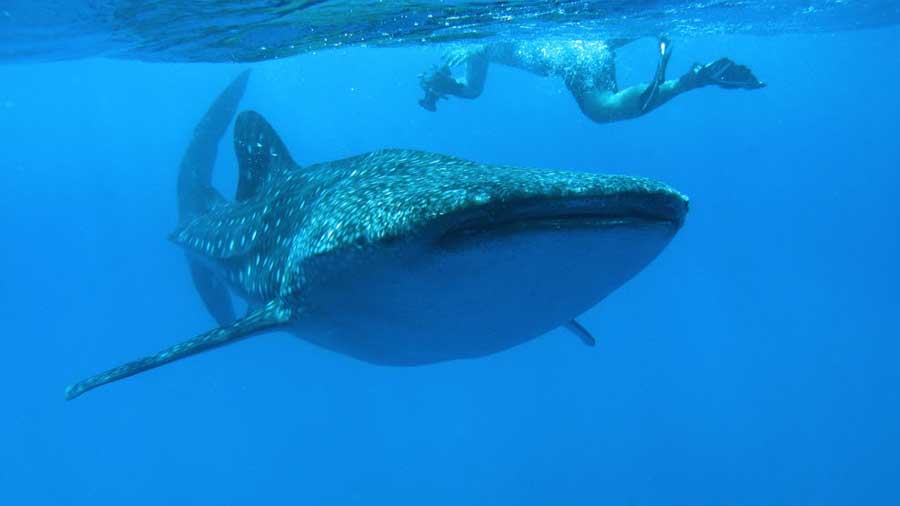
With the help of Coral Warriors, divers around India can secure their dates with sharks Courtesy: Vidhi Bubna
There’s this documentary called Seaspiracy on Netflix, which talks about the same thing, about how the media demonise certain species. It’s mostly done to benefit the aquarium industry. After all, you wouldn’t want to see a shark in an aquarium if you didn’t think it was dangerous to be around one in the ocean.
If someone is looking to apply for a grant from Coral Warriors, how can they approach you and what all should they keep in mind?
The grant is for anyone who’s interested to dive. The goal is to make diving more accessible to Indians. Anyone can apply for the grant, all the information about applications is available on our website. But the prerequisite is that they must be passionate about addressing climate change.
We go about assessing that passion and scope for impact through essays, trying to figure out who are the ones who are really interested in marine biodiversity. There are also questions asked by the selection committee at Coral Warriors about the future plans of applicants. We don’t just want to select people to go and dive, but we want them to come back and set up their own NGOs, workshops, social media campaigns or other initiatives to generate discussion about marine life.
How many applicants are you getting right now? And have you had applicants from this part of the world, chiefly Kolkata, the East and Northeast India?
When we started, we weren’t getting a lot of applicants because we were yet to promote what we were doing. But applications have picked up recently, and to give you an idea, we’ve had 30 applications in the last 15 days. Most of these are from tier-1 or tier-2 Indian cities. There are plenty of applicants from Kolkata and also from Guwahati.
Can you give us a primer on what marine conservation entails? How important is marine conservation in the larger context of protecting our environment?
Let’s start with the basics. Corals are basically the primary source of food for small fish in the ocean, who in turn are consumed by the big fish and then the big fish are eaten up by the sharks. Humans also eat sharks, especially shark fins, which go into soups in different cuisines. So it’s an entire food chain that we’re looking at. Just as plants kick-start the food chain on land, corals do the same in the ocean. There’s a prediction that at the rate at which marine biodiversity is depleting, our oceans could go empty and all the life they entail could be snuffed out by 2048. That’s bound to have consequences everywhere.
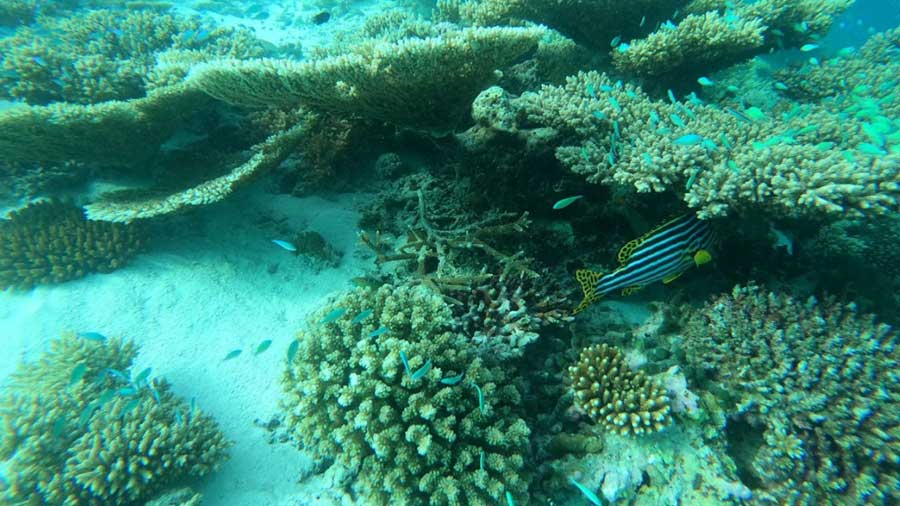
Bubna explains how corals are to oceans what plants are to land Courtesy: Vidhi Bubna
Besides Coral Warriors, you are also involved in a number of other projects creating systemic change. Could you give us some details about those?
In 2019, I got selected as the youth ambassador for India to Bhutan and I had the chance to meet the ambassador of Bhutan at the Royal Bhutanese Embassy in Delhi. That was a really interesting experience.
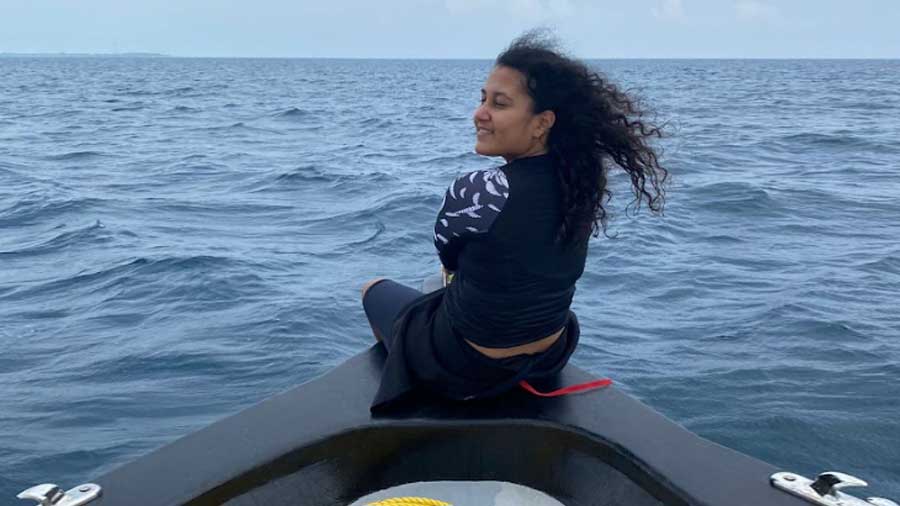
Bubna has served as an Indian youth ambassador to Bhutan Courtesy: Vidhi Bubna
I started this magazine called Explore Culture, which amplifies youth opinions across India and Bhutan, in an attempt to build peace by fostering mutual understanding. Besides these, I’m a writer on issues of women’s empowerment, international relations and climate change.
You have written a book called A Woke Guide to Life, which talks about empowering the youth. How do you understand the word “woke”, which has come to mean social justice advocacy for some and armchair activism for others?
We’re living in a world full of conflicting opinions and there are so many different identities that are being created. The reason for writing this book is mainly to make people feel comfortable embracing their own identity without being involved in this constant tussle to homogenise everything. For me, being woke or wokeness is about understanding how to live in a world where everyone is very different. I’d say my book is a peace-building book, looking at how to build peace within.
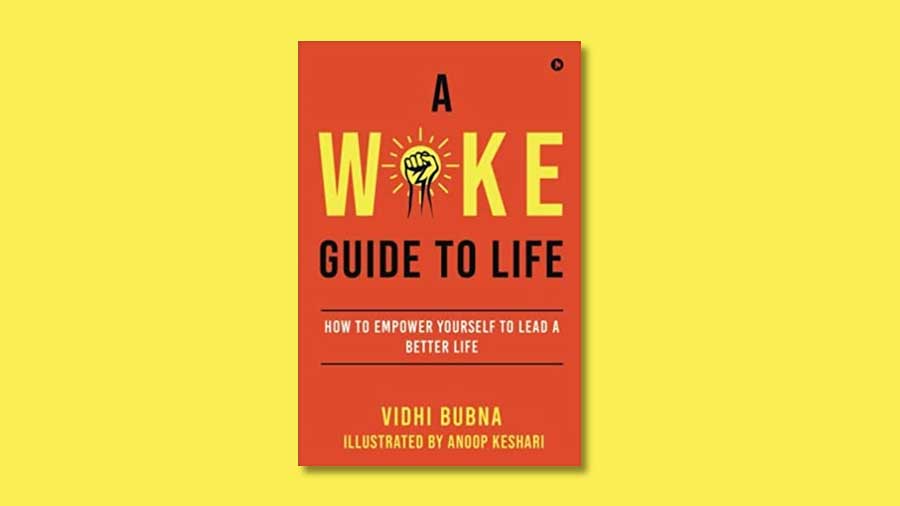
Bubna published her first book in October 2021, which argues how wokeness can eliminate regressive opinions Courtesy: Notion Press
What are your interests apart from the different projects you are involved in?
I love listening to music, especially Hans Zimmer. I think I’ve listened to Cornfield Chase some 300 times! I also like watching films on Netflix and I read avidly. But all of that’s done quite systematically. Every year I set myself a target of reading 52 books, one for each week of the year. I also try to binge watch the entire Oscar nominations list [for best film], which some think is a bit pretentious, but I enjoy it!
Give us some Oscar predictions then?
I think Kristen Stewart for best actress (Spencer), best actor is going to be Will Smith (King Richard) and best film will probably go to Don’t Look Up.
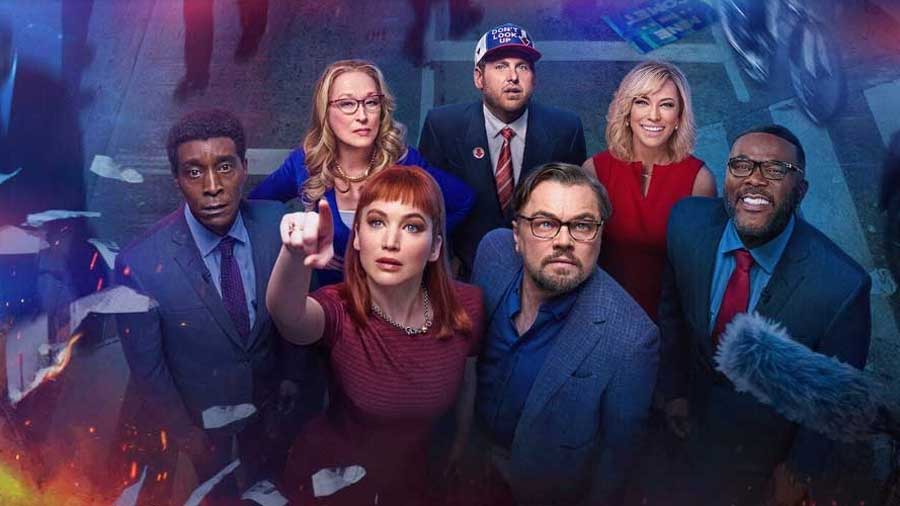
Bubna’s bet is on 'Don’t Look Up' in the best film category for this year’s Oscars TT Archives
Finally, where do you see yourself in five years’ time?
I take every day as it comes and I plan for the day. But yes, going forward, I’ll definitely like to see Coral Warriors expand. I want to turn it into India’s initiative, especially in terms of providing grants to people outside of tier-1 and tier-2 Indian cities. I want people from the smallest of villages in India to be able to go diving.
I also want to highlight the struggles of women in the Marwari community, how these women from Rajasthan have faced a lot of problems, chiefly sexism, in spite of moving to other cities like Mumbai. My next book is going to be about that.
